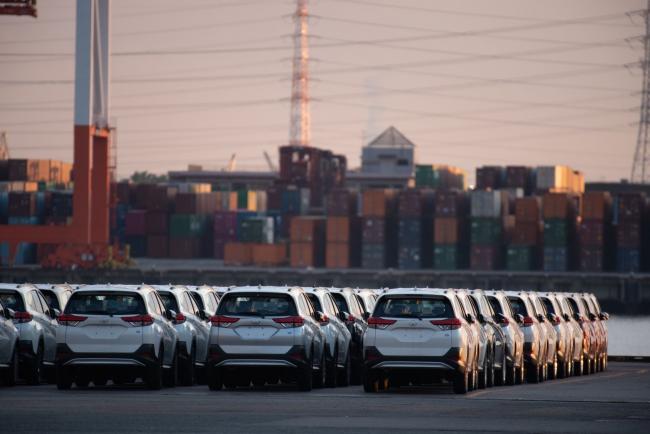(Bloomberg) -- Terms of Trade is a daily newsletter that untangles a world embroiled in trade wars. Sign up here.
Japan signaled it wanted to lay to rest the threat of new auto tariffs before agreeing to a final trade deal with U.S. President Donald Trump, after he left the door open for slapping levies on the nearly $50 billion sector.
Trump said he was not considering imposing punitive duties “at this moment,” after he and Prime Minister Shinzo Abe over the weekend announced an agreement-in-principle on trade, which they aimed to formalize in late September. The U.S. president kept the tariff threat alive by saying he could still impose the levies at a later date.
“I want to deal with this issue properly in the final stages of the trade negotiations with the U.S.,” Economy Minister Toshimitsu Motegi told reporters in Tokyo on Tuesday when asked about the possibility of being hit with tariffs. “The U.S. side has also agreed to this.”
The threat of steep new U.S tariffs on imported automobiles and components has loomed over the auto industry and major American trading partners since the Commerce Department in February found those imports could impair national security.
Trump backed that finding in May, but delayed imposing new levies on the sector through at least mid-November to allow U.S. negotiators to pursue trade deals with Japan and the European Union. He also agreed with Japan that there would be no new tariffs while trade talks continue.
“It’s one of the reasons we made the deal,” Trump said of tariffs on Japanese autos at the conclusion of the G-7 summit in France. “It’s something I could do at a later date if I wanted to but we’re not looking at that. We just want to be treated fairly.”
Trade War
Under the outline deal, Japan would slash tariffs on U.S. agricultural goods. In announcing the agreement, Trump said Japan would purchase large quantities of American wheat and corn, which could prop up farmers reeling from the trade war between the U.S. and China.
Trump-Abe Trade Deal Helps U.S. Farmers, Staves Off Auto Tariffs
The U.S. would in return cut tariffs on some industrial goods from Japan, which don’t include cars. Japan’s larger goal had been to avoid damage to its lucrative car industry, and Motegi said there was no need for the industry to be concerned about quotas or new rules on country of origin.
During the press conference Monday, Trump also said the U.S. is “very close” to reaching a trade pact with the European Union, citing the specter of additional levies of up to 25% on imported autos as a reason why.
“We made a great deal with Japan and we’re very close to maybe making a deal with the EU, because they don’t want tariffs, it’s very simple. They don’t want to tax cars, Mercedes-Benz, BMW,” Trump said. “I think we’re going to make a deal with the EU without having to go that route. I may have to go that route but maybe not.”
(Recasts with Japan Economy Minister Motegi comments)


